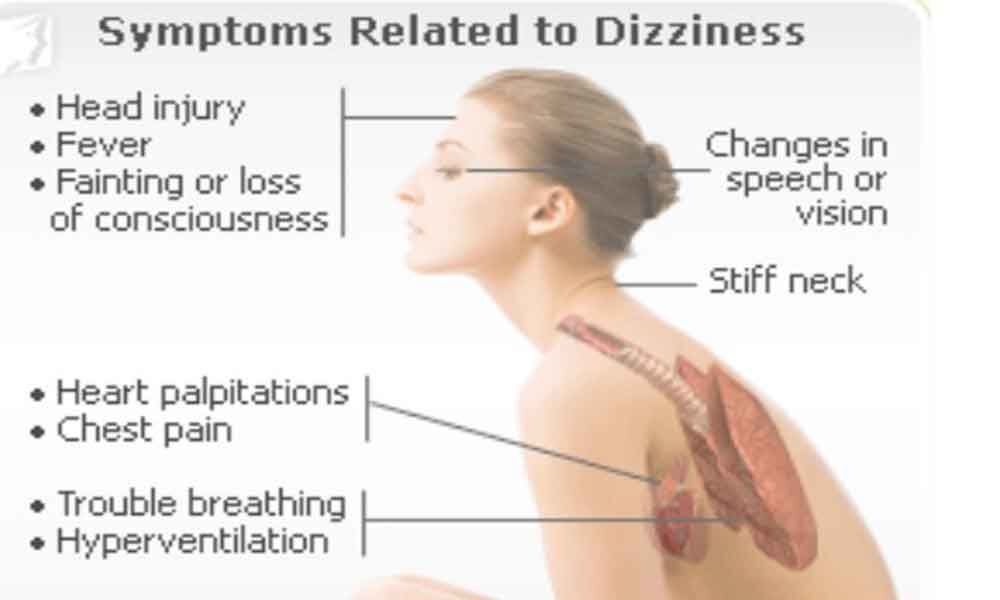Causes, symptoms & diagnosis of Vertigo
 Causes, symptoms & diagnosis of Vertigo
Causes, symptoms & diagnosis of VertigoVertigo is a sensation of spinning dizziness. It is not simple as many people maintain - fear of heights. It is often associated with looking down from elevated places, but it can also refer to on-going dizziness caused by the problems in inner ear or brain.
Hyderabad: Vertigo is a sensation of spinning dizziness. It is not simple as many people maintain - fear of heights. It is often associated with looking down from elevated places, but it can also refer to on-going dizziness caused by the problems in inner ear or brain.
This dizziness comes along with nausea, vomiting, sweating or difficulty in walking. Persistent vertigo is linked with mental health issues. A psychiatric problem may cause dizziness or vertigo and may lead to depression and anxiety in an individual. Vertigo is the most common dizziness.
Many children attempt to create a sense of vertigo by spinning or riding on roller coaster. This induced vertigo is self-limiting, it lasts for a few minutes and then it disappears. Vertigo caused as a result of an injury or illness may last for hours and days before resolving. Dizziness can happen to anyone at any age, but it is common in people aged 65 or above.
Symptoms of Vertigo
People with vertigo will have a feeling that their head is moving or spinning. Vertigo can be a symptom of other medical conditions, but it has its own symptoms that include
- A sense of motion sickness
- A feeling of fullness in ear
- Headache
- Nausea or vomiting
- Balancing problems
- Sensitivity problems
Vertigo is not just a condition of headaches or faintness. It is a rotational dizziness.
Causes of Vertigo
Vertigo is commonly caused by a problem with the way of balancing works in inner ear. It can also be caused by problems in the certain parts of the brain
- Migraine headaches or continuous severe headaches.
- Inner ear infection also known as labyrinthitis.
- Vestibular neuronitis – It is the inflammation of vestibular nerve, which runs into the inner part of the ear and sends messages to the brain that help in controlling the balance while walking.
Certain medication that causes inner ear infection
Benign Paroxysmal Positional Vertigo (BBPV) is the head movements that trigger vertigo.
There are some additional symptoms that depend on the cause of vertigo, such as high temperature, ringing in ears and hearing imbalance.
Types of Vertigo
There are different types of vertigo depending on how it is caused in the first place:
Peripheral Vertigo: It usually occurs when there is a disturbance in the balance organs of inner ears. The labyrinth of inner ear has tiny organs that enable messages to be sent to the mind in response to the gravity. These messages tell the brain when there is a movement from the vertical position. This enables people to keep their balance when they stand up. The disturbance to this system produces vertigo.
Central Vertigo: It is linked to the problems with the central nervous system. The disturbance is caused in the brainstem or the cerebellum. These parts deal with the perception of vision and balance of a person.
Diagnosis
During the evaluation for vertigo, a doctor will ask questions related to the history of events and symptoms associated with vertigo. This will include medications, illness and other medical problems. After evaluating all the symptoms a physical neurology examination will held to evaluate the function of the brain to determine if it is peripheral or central vertigo.
In coordination in eyes will help in underlining the position. A medical professional might perform DIX- Hallpike test. This involves repositioning of patient's head and monitoring of symptoms. Not everyone is suggested for this test. Instead, the professional might perform roll test, in which patient lies flat and head is rapidly moved side to side. This may reproduce vertigo symptoms and may help in determining the cause of the vertigo.
Some cases of vertigo may require MRI or CT scan of the brain or inner ear for excluding structural brain problems like stroke, acoustic neuroma and malignant tumor. In rare cases, a small opening or fistula is identified in the space between inner and middle ear, in which doctors will suggest surgical procedures like removal of inner ear sense organ. (The author is Director of Neurology, Agrim Institute of Neuro Sciences and Artemis Hospital)
By Dr Sumit Singh

















